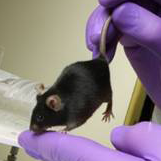Archived Content
The National Institute of Mental Health archives materials that are over 4 years old and no longer being updated. The content on this page is provided for historical reference purposes only and may not reflect current knowledge or information.
Transgenic Mouse Offers a Window on Gene/Environment Interplay: Prenatal Infection Alters Behavior in Genetically Vulnerable
• Science Update

Experiments in transgenic mice have provided a novel glimpse of how a prenatal infection could interact with a specific gene variant to cause behavioral and neurologic changes in adults that mirror those seen in major psychiatric disease. The mouse model used offers a means to explore gene/environment interactions and to identify both the mechanisms involved and critical periods of vulnerability.
Background
Research has established that the risk of developing a psychiatric illness and the features of the illness are the outcome of interactions between the environment and genes. Understanding the details of these interactions is a complex task, however. Many genes shape brain development and function, and gene function is in turn influenced by myriad environmental factors unfolding across a lifespan.
Genetic technology has made it possible to create model animals that carry risk genes, providing a way to focus on how single genes or mutations shape function and how specific environmental factors alter it.
This Study
Scientists at the Johns Hopkins University School of Medicine in Baltimore led by Mikhail Pletnikov developed the mouse model used in this study by inserting a gene with a mutation known to be associated in humans with schizophrenia, depression, and bipolar disorder. They used a technique that allows them to turn the gene on and off at desired time points during brain development. In earlier research, mice with the gene, mhDISC1 (mutant human disrupted-in-schizophrenia-1) showed effects on social behavior and mood which differed depending on the sex of the mice, and the age at which the gene was active.
In this work, conducted in collaboration with scientists at NIH's National Institute on Drug Abuse and the Maryland Psychiatric Research Center, University of Maryland, Baltimore, investigators injected pregnant mothers of mice carrying mhDISC1 with a compound (poly I:C) that is known to activate the mother's immune system, much as an infection would. Poly I:C was given at a time during gestation that is roughly equivalent to the end of the first trimester in humans. Offspring with the active mutated gene whose mothers had received poly I:C showed a variety of changes in comparison with both normal mice who were exposed to immune challenge and mutant mice whose mothers had not received the immune challenge. When given standard behavioral tests, they showed increased anxiety and depression-like behavior, and their social interactions were altered. Social interactions among mice are a distinctive and prominent part of their behavior; social behavior is also affected in human mental illness. Learning and memory were not affected.
There were changes in their brains as well. A hormonal indicator of brain-based reactivity to stress was reduced. A part of the brain with a central role in emotion, the amygdala, was smaller in the test mice. On a microscopic level, fine nerve terminals in the hippocampus, a part of the brain that is central to emotion and memory, were reduced in density. Signaling by the neurotransmitter serotonin, which plays a role in mood, was also reduced in the hippocampus. Similar changes have been reported in humans with mood disorders.
Significance
This work demonstrates the potential of this approach for teasing apart the complexity of gene/environment interactions. As an example of an environmental factor with a possible impact on mental health, prenatal infection mirrors a connection observed in humans; previous research has found that children born to mothers who had prenatal infections such as influenza, for example, are at increased risk of developing schizophrenia. The fact that studies preliminary to this one found sex differences in the effects of mhDISC1 also reflects the situation in humans, where there are sex-related differences in risk of mental illness.
Finally, this model allows investigators to probe the mechanisms of these effects and the role of timing during development. Poly I:C predictably had an impact on the levels of signaling molecules called cytokines that engage or suppress the immune response, but that also play a role in the development of the nervous system. A complete understanding of how infection interacting with mhDISC1 could alter the activity of cytokines and derail neurodevelopment could offer clues to treatment. The study also found that the infection-related changes in behavior were only observed if the gene was active throughout the lifespan, suggesting it might be possible to shut down the negative effects of the mutated gene, even if they were triggered by past infection.
This approach offers a way to explore many dimensions of the complex interactions of genes with the environment and to suggest avenues for future treatment aimed at the underlying causes of these conditions.
The research described in this update was funded in part through the American Recovery and Reinvestment Act (ARRA).
Reference
Abazyan, B., Nomura, J., Kannan, G., Ishizuka, K., Tamashiro, K.L., Nucifora, F., Pogorelov, V., Ladenheim, B., Yang, C., Krasnova, I.N., Cadet, J.L., Pardo, C., Mori, S., Kamiya, A., Vogel, M.W., Sawa, A., Ross, C.A., and Pletnikov, M.V. Prenatal interaction of mutant DISC1 and immune activation produces adult psychopathology. Biological Psychiatry 2010;68:1172-1181.
